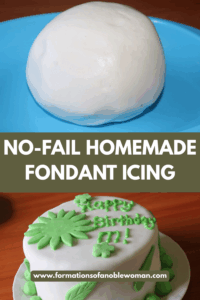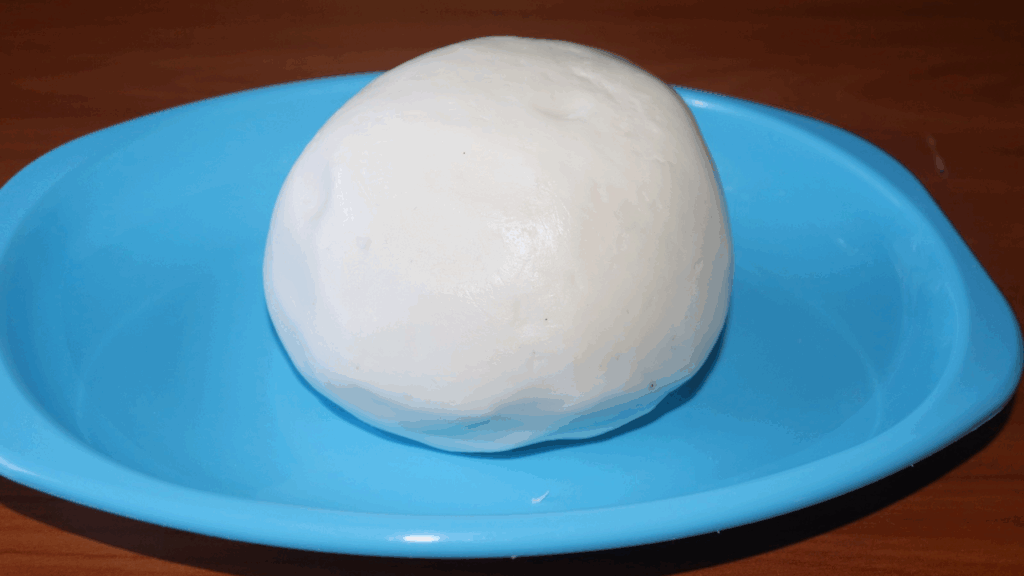How to Make Fondant Icing
If you’ve ever admired a smooth, elegant cake with a perfectly polished finish and thought, “How did they do that?” — the answer is most likely fondant icing. This soft, pliable sugar paste is a favorite among professional bakers for covering cakes and crafting stunning edible decorations. But here’s the good news: you don’t have to be a pastry chef or spend a fortune on store-bought fondant to achieve that same gorgeous result. In fact, with just a few simple ingredients, you can learn how to make fondant icing right in your own kitchen.
For a long time, I struggled to make fondant—mainly because I couldn’t find glucose syrup where I lived. When I finally got my hands on it while traveling, I found it cumbersome and messy to work with. That changed when a friend introduced me to glucose powder—and I’ve never looked back.
Making fondant icing at home is not only cost-effective, but also incredibly satisfying. You get to control the taste, texture, and even the color — something that isn’t always possible with pre-packaged fondant.
Whether you’re planning a birthday cake, a wedding centerpiece, or just want to explore cake decorating for fun, this easy fondant recipe will help you create a professional finish every time.
This blog post is your go-to guide on how to make fondant icing using basic pantry ingredients like gelatin, glucose, and icing sugar. No fancy equipment required — just a saucepan, a mixing bowl, and a little elbow grease.
Even if you’re new to cake decorating, this step-by-step tutorial will walk you through the entire process, from blooming the gelatin to kneading the final dough.
By the end, you’ll not only know how to make fondant icing from scratch, but you’ll also have the confidence to use it on your next cake project. So roll up your sleeves and let’s get started with this no-fail homemade fondant icing recipe — perfect for every home baker who wants beautiful results on a budget.
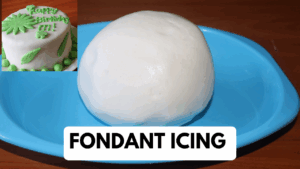
What is Fondant Icing?
Fondant icing is a smooth, pliable sugar paste often used to cover cakes and create decorative cake toppers. It gives cakes that flawless, professional look that’s hard to achieve with regular frosting. The best part? You don’t need to buy expensive store-bought fondant when you can easily make it at home using just a few ingredients.
Why Make Homemade Fondant?
Making fondant at home comes with a lot of benefits:
- Cost-effective: Store-bought fondant can be pricey. This homemade version saves you money without sacrificing quality.
- Customizable: You control the flavor, color, and consistency.
- No preservatives: Homemade fondant icing is made with simple, clean ingredients.
- Fun and rewarding: It’s a joy to make and even more fun to use for decorating cakes with your family.
- So, let’s get started making our fondant icing!
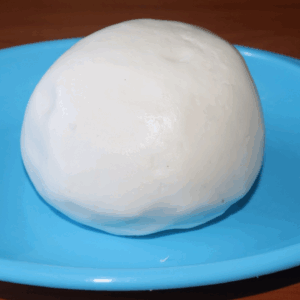
How to Make Fondant Icing at Home (Easy No-Fail Recipe)
Equipment
- 1 Saucepan
- 1 Mixing Bowl
- Measuring cups and spoons as needed
- 1 Wooden spoon or heat-resistant spatula
- Fine mesh sieve
- Clean countertop or silicone mat
Ingredients
- 1 tsp unflavored gelatin
- ¼ cup cold water
- 2 tbsps fat (shortening or butter)
- 1 tbsp glycerine
- ½ cup glucose powder (or use glucose syrup if preferred)
- 5 & ½ to 6 cups icing sugar, sifted Note: If you're using glucose syrup instead of powder, you’ll still follow the same process, just measure out the same quantity.
Instructions
Step 1: Bloom the Gelatin
- Start by pouring 1/4 cup cold water into a saucepan. Then, sprinkle the gelatin evenly over the surface. Allow it to sit for 5 minutes — this is called blooming, and it helps the gelatin dissolve smoothly later on.
Step 2: Sift the Icing Sugar
- While the gelatin is setting, sift about 6 cups of icing sugar into a large mixing bowl. Sifting helps avoid lumps and makes the dough easier to work with.Separate about 2 cups and keep them aside for gradual mixing later.
Step 3: Melt the Gelatin Mixture
- Once your gelatin has bloomed, place the saucepan on low heat and gently warm it. The gelatin will melt into the water. Stir continuously and be careful not to let it boil.As the mixture melts, you'll start adding the rest of the ingredients.
Step 4: Add Glycerine and Fat
- Add the glycerine and gently swirl or stir it in. Next, add the fat (vegetable shortening or unsalted butter works great). Allow the fat to melt completely, reducing the heat if the mixture looks like it’s about to simmer.
Step 5: Add Glucose Powder or Syrup
- Now, stir in the glucose powder (or syrup). Mix well until everything is fully melted and combined. Keep the heat low to avoid cooking the mixture. Once it’s well combined and just begins to simmer, immediately remove it from the heat. You don’t want to overheat it.
Step 6: Combine with Icing Sugar
- Create a well in the center of your sifted icing sugar and pour the hot gelatin mixture into it. Using a wooden spoon or heat-safe spatula, start mixing everything together.The mixture will be very sticky at first — that’s normal. Slowly add the remaining icing sugar (the 2 cups you set aside earlier) a little at a time, mixing as you go.
Step 7: Knead the Fondant
- Once the mixture becomes too thick to stir, it’s time to use your hands. Lightly grease your hands with a bit of shortening to prevent sticking, and knead the fondant in the bowl until it begins to come together.Transfer it onto a clean surface dusted with icing sugar and knead it for about 5–10 minutes, until it forms a smooth, pliable dough. The consistency should be soft but not sticky.
- You fondant is ready for you to work with!
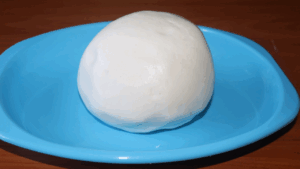
- I used this fondant to decorate this cake below. Remember you can use fondant in multiple other ways as you will read below.
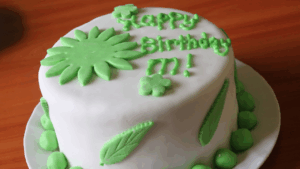
Video
Notes
How to Store Homemade Fondant
If you’re not using the fondant immediately, wrap it tightly in cling film or foil and store it in an airtight container. You can keep it at room temperature for a few days or freeze it for longer storage. To use frozen fondant, allow it to come to room temperature, then knead it gently before rolling it out. If it feels dry, add just a few drops of water and knead until soft and smooth.Tips for Using Fondant Icing
- Work quickly: Fondant dries out when exposed to air for too long. Always keep unused portions wrapped.
- Use cornstarch for rolling: This prevents sticking when rolling fondant out.
- Coloring: Add gel food coloring during the kneading stage for custom colors.
Common Fondant Questions
Can I make this fondant icing without glycerine?
Glycerine helps keep the fondant pliable and smooth. If you skip it, the fondant may become dry or crack, but you can try adding a bit more fat or glucose to help.What’s the difference between fondant and icing sugar paste?
They’re often used interchangeably, but fondant usually refers to the rollable kind used for cake covering, while sugar paste may also refer to modeling paste or gum paste, which hardens more for decorations.What Can I Use Fondant Icing For?
Fondant isn’t just for wedding cakes! Try it for:- Birthday cake designs
- Baby shower toppers
- Shaped cookies
- Cupcake decorations
- Edible figurines or flowers
If you loved this recipe, be sure to check out our popular No-Mixer Buttercream Frosting here. I’m certain you’ll enjoy it too, plus more recommended simple and delicious meals for your home and hospitality below.
Want more delicious recipes, hospitality tips, budget-friendly living ideas, and biblical encouragement for your journey?
Sign up for our FREE weekly newsletter here and receive uplifting content straight to your inbox.
You’re also warmly invited to subscribe to our YouTube channels here and here for video versions of this content and more inspiration for your home and faith walk.
Thank you for stopping by. Until next time—happy cooking and God bless!
Recommended:
No-mixer Cream Cheese Frosting
No-mixer Coconut Cream Cheese Frosting
Basic No-oven Cake Recipe on Gas
Fermented Porridge Recipe the Natural Way
No Oven Pan-baked Danish Cookies
No Oven 2-ingredients Roasted Groundnuts Recipe
Easiest 4-ingredient Mandazi on a Budget Recipe| Kenyan Mandazi
Cold Water Chapati Recipe| Kenyan Roti
